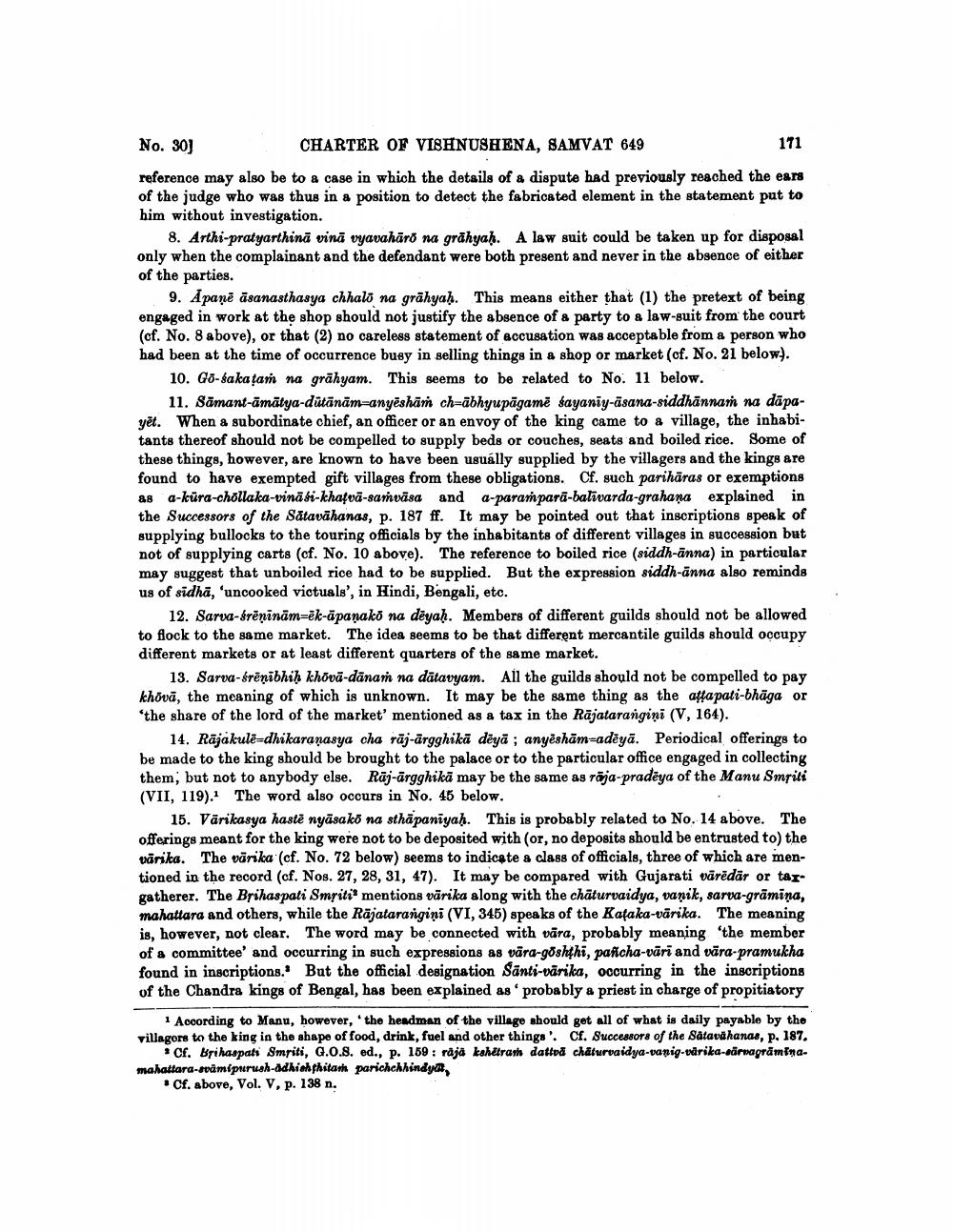________________
171
No. 30)
CHARTER OF VISHNUSHENA, SAMVAT 649 reference may also be to a case in which the details of a dispute had previously reached the ears of the judge who was thus in a position to detect the fabricated element in the statement pat to him without investigation.
8. Arthi-pratyarthină vină vyavahāro na grāhyak. A law suit could be taken up for disposal only when the complainant and the defendant were both present and never in the absence of either of the parties.
9. Apaņē āsanasthasya chhalo na grāhyah. This means either that (1) the pretext of being engaged in work at the shop should not justify the absence of a party to a law-suit from the court (cf. No. 8 above), or that (2) no careless statement of accusation was acceptable from a person who had been at the time of occurrence busy in selling things in a shop or market (cf. No. 21 below).
10. Go-sakatań na grāhyam. This seems to be related to No. 11 below.
11. Sämant-āmātya-dütānām-anyēshāṁ ch-abhyupāgame sayaniy-āsana-siddhānnan na dapayet. When a subordinate chief, an officer or an envoy of the king came to & village, the inhabitants thereof should not be compelled to supply beds or couches, seats and boiled rice. Some of these things, however, are known to have been usually supplied by the villagers and the kings are found to have exempted gift villages from these obligations. Cf. such parihāras or exemptions as a-kūra-chollaka-vināsi-khatvā-samväsa and a-paramparā-balivarda-grahana explained in the Successors of the Sātavāhanas, p. 187 ff. It may be pointed out that inscriptions speak of supplying bullocks to the touring officials by the inhabitants of different villages in succession but not of supplying carts (cf. No. 10 above). The reference to boiled rice (siddh-anna) in particular may suggest that unboiled rice had to be supplied. But the expression siddh-anna also reminds us of sidha, 'uncooked victuals', in Hindi, Bengali, etc.
12. Sarva-drēninām=ēk-äpanako na deyah. Members of different guilds should not be allowed to flock to the same market. The idea seems to be that different mercantile guilds should occupy different markets or at least different quarters of the same market.
13. Sarva-frēnibhih khovu-danan na dātavyam. All the guilds should not be compelled to pay khövā, the meaning of which is unknown. It may be the same thing as the attapati-bhāga or 'the share of the lord of the market' mentioned as a tax in the Rājatarangini (V, 164).
14. Rājakule=dhikaranasya cha rāj-ārgghikā deyā ; anyëshām=adēya. Periodical offerings to be made to the king should be brought to the palace or to the particular office engaged in collecting them, but not to anybody else. Räj-ārgghikā may be the same as rõja-pradeya of the Manu Smriti (VII, 119). The word also occurs in No. 45 below.
15. Vārikasya hastë nyāsako na sthapaniyaḥ. This is probably related to No. 14 above. The offerings meant for the king were not to be deposited with (or, no deposits should be entrusted to the vārika. The värika (cf. No. 72 below) seems to indicate a class of officials, three of which are mentioned in the record (cf. Nos. 27, 28, 31, 47). It may be compared with Gujarati värēdar or tar gatherer. The Brihaspati Smriti mentions vārika along with the chäturvaidya, vanik, sarva-grāmina, mahattara and others, while the Rājatarangini (VI, 345) speaks of the Kafaka-värika. The meaning is, however, not clear. The word may be connected with vāra, probably meaning 'the member of a committee' and occurring in such expressions as vāra-goshthi, paficha-väri and vāra-pramukha found in inscriptions. But the official designation Santi-värika, occurring in the inscriptions of the Chandra kings of Bengal, has been explained as probably a priest in charge of propitiatory
According to Manu, however, the headman of the village should get all of what is daily payable by the villagors to the king in the shape of food, drink, fuel and other things'. Cf. Successors of the Satavahanas, p. 187.
i cf. Brihaspati Smriti, G.0.8. ed., p. 169 : raja kahttram datta chäturvaidya-vanig-värika-särwagrāmina. mahattara-wamipurush-ddhishthitam parichchhindyca,
. Cf. above, Vol. V, p. 138 n.




